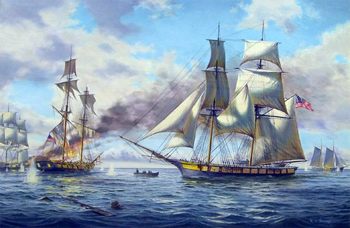
Born in Gettysburg, Pennsylvania, it was only natural that Gerry Altoff would have an interest in history. Gerry is a widely recognized expert on the Battle of Lake Erie and the War of 1812 as well as flint period small arms, artillery, and black powder safety.
He has published numerous historical papers, presented at a wide variety of conferences, and authored or co-authored five books, including: Deep Water Sailors – Shallow Water Soldiers, Manning the United States Fleet on Lake Erie, 1813. Amongst My Best Men: African-Americans and the War of 1812, and A Signal Victory: The Lake Erie Campaign: 1812-1813.
His National Park Service career began in 1972. He was assigned to Zion National Park in Utah (1972-1975), Theodore Roosevelt National Park in North Dakota (1975-1979) before coming to the Perry’s Victory & International Peace monument at Put-in-Bay, Ohio in 1979.
Gerry retired from the National Park Service as Chief Ranger and Historian at Perry’s Victory & International Peace Memorial in December 2004. He now lives in Williamsburg, Virginia and serves as a consultant on the War of 1812 and as a subject expert on flint period small arms, artillery, and black powder safety.
The Battle of Lake Erie

On September 10, 1813, Oliver Hazard Perry and a fleet of 9 American tall ships engaged a British fleet of 6 men of war northwest of South Bass Island in Lake Erie. Perry’s fleet won the day, and wrested control of the Great Lakes supply lines from the British in the War of 1812. “We have met the enemy, and they are ours, two ships, two brigs, one schooner and one sloop” became one of the most often quoted military communiqués in history.
However, the reality of the battle was gruesome. Gerry Altoff brings this moment in history to life, providing background information relative to America’s involvement in the war, the campaigns of the war in the Old Northwest, and the events at Erie, Pennsylvania, including both building and manning the U.S. fleet.
The meat of the program focuses on the complex naval engagement itself, including the problems experienced by both the American and British commanders, the quest for tactical advantage, the tactical complexities of the battle, the controversial maneuvers of the Brig Niagara, and personal vignettes of involved individuals. The program concludes with a brief follow-up on the political and military implications of Perry’s crucial victory on Lake Erie.



